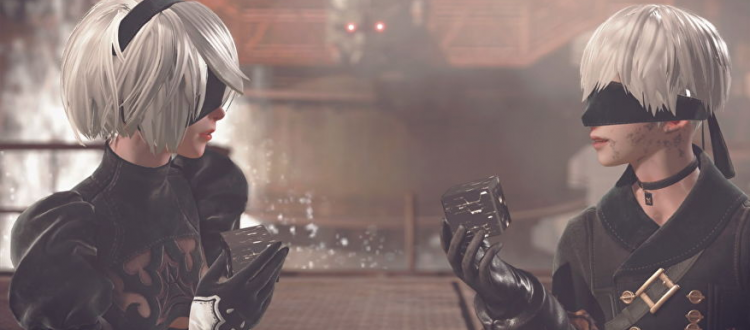NeiR Automata: On Slaughtering Innocence with Aesthetic
It takes a lot to get me writing about video games. Even in COVID times, there are too many games to experience as a player to bother putting pen to paper for the chance at being part of a discourse. Say nothing for the fact that “games” “journalism” often seems like little more than an altar to the gods of harassment. With this in mind, I would generally rather punch myself repeatedly in the bollocks before I risked having an opinion on video games, even in my own little corner of the internet.
Let that preface set the tone for how much I’ve reveled in my first ten hours with NeiR: Automatia. I struggle to remember the last time I was content to follow wherever a game wanted to go. Probably the XCOM/XCOM2/XCOM2:WOTC trilogy, or possibly when I was spending a lot of time playing Stardew Valley during cancer treatment. And what NeiR:Automata does so well, as the title of this piece suggests, is to make the player an accomplice in the dead sexy destruction of innocence. Through that very intentional and very clever creation of consent, NeiR executes a first act unlike any other.
This first act follows a prologue, replete with a rising, emotive, and heroic score, that sets the tone for a seemingly simple story: in the distant future androids are fighting a losing battle to reclaim the Earth. Some 6000 years before the game began, aliens and their machine army wiped out humanity, save for a few hundred thousand people living on the moon. This hook is fairly standard as video game narrative goes. But once the first act began, and I had the freedom to explore the world, I came to understand something was inherently wrong with this world. It wasn’t a “are we the baddies” moment. It was something much simpler and utterly intoxicating in its ambiguity. I know 2B and 9S, the android protagonists of the story, will likely become the baddies. The question at hand is how will this game give me a path to redeeming them?
This nebulous morality sticks the landing not through something so petty as inviting the player to explore, but also police, their violent compulsions. This isn’t Grand Theft Robot Rampage feat. androids in skirts and short pants. This game lives in a slow burn as it presents the freedom to explore amid a deterministic story that drives the would-be hero androids down the wrong path. In that duality, the game’s aesthetics and narrative are consistently building on each other.
The slickness of Yorha’s wardrobe, with high cut skirts, structured lines, and “black is the new black” colour scheme becomes the first point of dissonance against the robot enemy that should not have been a match for humanity circa 4000 A.D. These robots, humanity’s great existential threat, are for lack of a better word, cute. The dissonance is almost instant, because if you say “robots that killed billions and drove the remaining survivors into exile on the moon” I think Cyberdyne Systems Model 101 T-800s. Instead, NeiR offers a plague of tinker toys. Creatures that unlike the androids, who would look equally at home in either a sex club or walking a runway in someone’s fall collection, lurch about as if powered by sprockets and torsion springs. These sworn enemies of man spout random words about fear and pain, but 9S – a good dog in android form – easily writes them off as vocalizing without any spark of intelligence.
Despite his assurances, there’s a child-like innocence to these adorable little murder bots. I look at them and see The Iron Giant or the outcome of a human child sticking some foam balls into silo cups before announcing they have made a robot. Thus with every stroke of 2B’s swords – weapons that look like they were designed by a concept car artist riding an Adderall high – the game made me that much more complicit in the stylistic, almost ritual, destruction of innocence.
I’m not supposed to feel bad for the disposable goons dying by the sword. They are a means to my end, not fodder for reflection. I don’t want to have to reconcile the reality of a “disposable” creature with my act of dispatching them. More importantly, in what reality are these creatures of obviously lesser gods a threat to anybody? How dare this game be as brilliant as it is in making me fundamentally question what I am doing and why any of it is necessary.
I’ll offer a nod to fellow critic Simon McNeal when I say that given this game’s reputation for being reflective and philosophical, its fundamental act – where that which is beautiful destroys that which is ugly – must be read as a clear poke in the eye of Plato and Platonic aesthetic. An early invocation of Sartre via a robot named Jean Paul, who offers dialogue as impenetrable to me as it is to the NPCs (something about essence preceding existence), probably has more to say along those lines. But from the perspective of the philosophical dilettante, it’s clear NeiR’s ludonarrative wants me to see there is no truth in beauty. There is only destruction on the path to finding the right questions: is this really the righteous path? How do I redeem these characters? Is there self-determination for programmed beings? Subsequently, can there be self-determination for humanity if our creatures reflect our own shortcomings? Any game brave enough to ask these questions in the first act gets to keep me until the credits roll.









